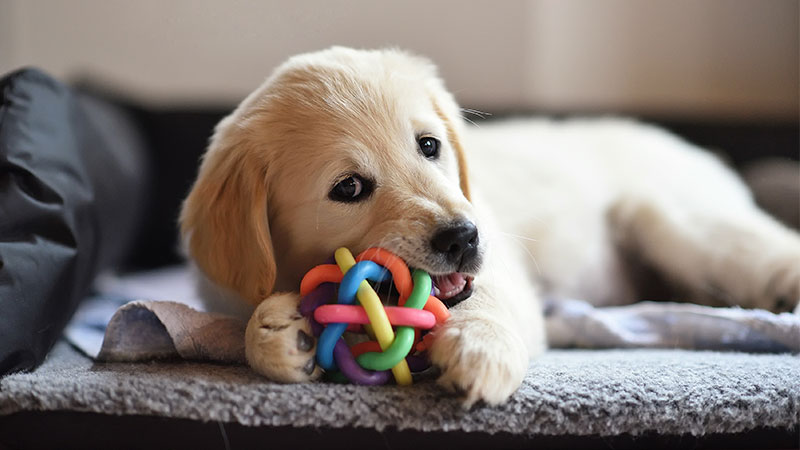Whenever I get frustrated that my dog has destroyed another dog toy, my husband tells me, “It’s her job!” So, I toss the ripped toy in the trash and invest in more. That is just how it works over here. And I imagine how it works in many households with dogs. Because chewing is just a part of life for our furry friends. It is their way of coping with a variety of situations life throws their way. Let’s look at a few.
Puppies chew to relieve pain caused by incoming teeth.
At the puppy stage, hard, rubber dog toys are your best option. Invest in “indestructible” toys that provide the resistance your sore puppy’s gums need. You will find yourself replacing toys like the West Paw Zogoflex Qwizl Puzzle a lot less frequently than the squishy kinds with a squeaker! You may also opt to wet a washcloth and freeze it for your dog to chew to ease pain but be careful to reinforce what is his to chew and what is off-limits. Most puppies grow out of this intensified chewing stage by six months of age.
Dogs chew to keep their jaws strong and their teeth clean.
Chewing is an instinctive behavior for dogs and is perfectly normal. Offer your dog a variety of carefully chosen chew toys to keep him interested and safe. Dogs should be discouraged against chewing sticks and cooked bones, as they can splinter and cause intestinal blockage if swallowed. Natural bones and bones that are sold specifically for chewing are ok as long as you keep your eye on your dog when he is chewing. Never leave your dog alone with a bone!
Puzzles and Kong toys can be great alternatives to bones if your dog is a vigorous chewer. Hide a treat or freeze some peanut butter inside a Kong toy and your dog will be busy for hours!
Dogs chew when they are bored or experiencing separation anxiety.
Dogs who are left alone often can be prone to destructive chewing simply because of a lack of stimulation or due to separation anxiety. Make sure to dog-proof your home before leaving your dog alone for an extended period of time. Pick up items he may be tempted to chew and put a lid on trash cans and clothes hampers – natural draws to the mischievous pup looking for something to get into when bored. Making sure your dog gets plenty of exercise and rotating his toys can also help avoid destructive chewing. Set him up for success!
Remember to take care of your dog’s teeth and gums.
It is important to consider your dog’s dental health when it comes to chewing. If you notice your dog nursing a sore mouth, make an appointment with your vet as soon as possible. The health of your dog’s mouth plays an important role in his overall well-being. Chewing on toys or dental treats is no substitute for regular teeth cleanings.
PetPartners’ DefenderPlus plan can help reimburse towards the cost of routine preventative care items such as dental cleanings. Also, see our post, Five Ways to Care for Your Dog’s Teeth for more tips on caring for your dog’s oral health.

